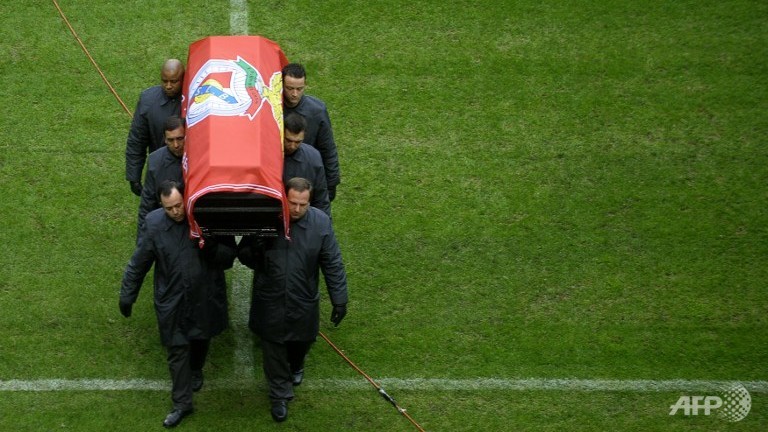Portugal pays final homage to Eusebio

Officials carry the coffin of Benfica football legend Eusebio da Silva Ferreira on the pitch of the Luz stadium in Lisbon.
(AFP/Miguel Riopa)
To the applause of thousands of supporters, Eusebio's coffin was carried around Lisbon's Luz stadium inside a black limousine as Italian tenor Andrea Bocelli's "Con te partiro" was played from loudspeakers.
Fans, some in tears, sang the national anthem and waved flags bearing Eusebio's image as the coffin draped in the red and white flag of Eusebio's club Benfica drove by.
Before being driven around the stadium an endless stream of mourners, including politicians and football players, braved the rain and came to bow to the coffin which was displayed in a chapel inside the stadium.
Flags flew at half mast across Lisbon with the Portuguese government decreeing three days of mourning for Eusebio da Silva Ferreira, who died of a heart attack early Sunday aged 71.
"Portugal has today lost one of its most beloved sons, Eusebio da Silva Ferreira. The country mourns his death," President Anibal Cavaco Silva said.
Thousands of fans, many wearing Benfica scarves around their necks, applauded and sang the national anthem when Eusebio's body arrived the at Luz stadium on Sunday.
Supporters placed flowers, handmade posters and scarves with the club's red and white colours.
A funeral mass will be held in the Seminary Church near the stadium on Monday at 1600 GMT, and the footballer will be laid to rest at the Lumiar cemetery in the city's northern suburbs.
Eusebio, born into poverty in Africa, scored 733 goals in 745 matches and rivalled all-time greats including Pele, Alfredo Di Stefano and Charlton.
"I was the best player in the world, top scorer in the world and Europe. I did everything, except win a World Cup," Eusebio said in a interview in 2011, recalling his tears after Portugal's loss in the 1966 World Cup semi-final to England.
From humble origins in the former Portuguese colony of Mozambique, Eusebio was to emerge as one of the world's most feared strikers, combining panther-like pace with a ferocious shooting ability.
Born in 1942, the poor boy from Maputo rose to prominence in Mozambique football circles as a teenager through his performances for Sporting Lourenco Marques.
With his exceptional technique, strength and goal-scoring record, it was not long before word of Eusebio's prowess soon filtered back to Portugal and he joined Benfica.
In an early game for Benfica, he had outshone Pele in a friendly with Santos, and in 1962 he scored the crucial goals in a 5-3 victory over Real Madrid in the European Cup final.
When Madrid's legendary Hungarian Ferenc Puskas symbolically handed his jersey to Eusebio after the match, the message was clear - the torch had passed, and in 1965 Eusebio was awarded the Ballon d'Or.
Pele, the Brazilian widely regarded as the greatest footballer of all time, took to his Twitter account to tell the world: "I cry for the death of my brother Eusebio. We became friends during the 1966 World Cup in England."
Pele published a photo of the two men together when Portugal beat Brazil 3-1 that year, with Eusebio scoring two of the goals.
While Eusebio excelled with Benfica in Europe, it was his exploits at the 1966 World Cup for which he will be best remembered.
Eusebio's nine goals in England propelled Portugal to a third-place finish, and a succession of opposing teams simply had no answer to the power and pace of his play.
In the quarter-finals Eusebio was unstoppable, pulling off a one-man rescue act after Portugal went 3-0 down against North Korea after just 20 minutes.
The Koreans were blown away by a four-goal display from Eusebio as the Portuguese won 5-3.
He scored his ninth of the tournament in the third-place play-off win over the Soviet Union. He finished his 64-cap career having accumulated 41 goals for Portugal.
He also earned European football's Golden Boot award twice and was Portugal's top scorer every season between 1964 and 1973. He helped Benfica to 11 league championships and five domestic cups.
Married with two daughters, in retirement he became an ambassador for Benfica and the Portuguese football federation.
What the stars mean:
★ Poor ★ ★ Promising ★★★ Good ★★★★ Very good ★★★★★ Exceptional
Latest News
More News
- Muong Thanh Golf Club marks five years with flagship golf tournament (October 01, 2025 | 18:25)
- TCP Vietnam opens new youth sports yard in Danang (September 22, 2025 | 18:46)
- 'Run For The Heart' to return to Ho Chi Minh City this September (August 29, 2025 | 15:31)
- LION Championship 25 to feature title showdowns in Khanh Hoa (August 15, 2025 | 14:24)
- AFF Women’s Championship 2025: Vietnam defeat Thailand in tense showdown (August 15, 2025 | 14:21)
- Hung Yen win National U11 Football Championship – Nestlé MILO Cup 2025 (August 06, 2025 | 11:34)
- Vietnam win third consecutive ASEAN U-23 title (July 30, 2025 | 07:00)
- Game-changing tech and startups to star at Vietnam Sport Show (July 18, 2025 | 14:56)
- Vietnam women's team secure 6-0 victory over UAE in Asian Cup qualifiers (July 04, 2025 | 15:32)
- Herbalife Vietnam supports VnExpress Marathon Quy Nhon 2025 (June 17, 2025 | 17:38)
















 Mobile Version
Mobile Version